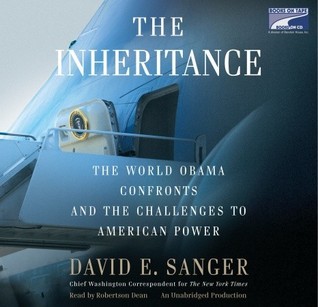The premise of The Inheritance is simple: what are the greatest foreign policy problems Obama inherited? It’s a difficult subject to address without criticizing Bush, and Sanger pulls no punches, but it’s really about what Obama will face. As such, it was an excellent primer on foreign policy when I originally read it shortly after the election. I believe it remains valuable today. Sanger, pointedly avoiding Iraq, identifies five countries as the greatest challenges to the US: Iran, Afghanistan, Pakistan, North Korea, and China (it is not by accident he avoids Iraq, Sanger sees its greatest cost as one of opportunity). Other countries remain troublesome (notably, Russia and Venezuela; more recently, Mexico), but I think these are still our five greatest threats.
Three years later Sanger’s work still holds. Iran continues to press forward in its nuclear ambitions while the US balks at Israel’s preference for a preemptive approach. Pakistan proved to have been the hiding place of Bin Laden. North Korea replaced its leader, but we would do well to remember it has turned the rope-a-dope into an art of strategic statecraft. Recent events threaten to undo all the good work of the past few years in Afghanistan and China marches on untrammeled by pressure from the US.
Sanger devotes considerable attention to nuclear proliferation. One might be tempted to make this a point of criticism, given its lack of political salience these days, but let there be no doubt—nuclear proliferation is the greatest threat to America. It was in 2004—when both Bush and Kerry immediately answered as such during a debate—and it remains so today. Sanger devotes considerable space to detailing our failures to prevent nuclear proliferation during Bush’s presidency. At the epicenter was a Pakistani scientist named A.Q. Khan. He was selling nuclear secrets going back to the administrations of the elder Bush and Clinton. Covert work to thwart his efforts with Libya was highly successful, less so with Iran. It was Khan who sold vital technology to the North Koreans.
At first blush China seems an odd choice for the “Big 5.” But it makes a lot of sense when you consider the implications of an autocratic dictatorship as your major economic rival. Sanger sometimes falls victim to seeing the mote in America’s eye but failing to see the plank in China’s—it’s frankly laughable to think of equating the U.S. with China in human rights or regulatory environment—and he can turn a blind eye to history—he compares U.S. reaction to China today to reaction to Japan in the 80s without drawing the connection that neither had a sustainable economic model—but Sanger’s understanding of the China problem is generally excellent. Bush’s “soft” approach to China is the rare policy to meet Sanger’s approval (I don’t know that I agree). China is pursuing a “puncture strategy” militarily— defeat America’s superior technology however possible, whether by shooting down satellites, with anti-aircraft carrier missiles, or cyberattacks. Sanger sees China’s rise to become a “peer competitor” as inevitable, so we better embrace it. But China will never become our economic equal without massive reforms that are by no means inevitable. But they may, and they will likely remain an second-tier (with America lonely on the first tier) economic superpower. There is some good news, e.g., China has shown a grudging responsiveness to international pressure.
The China section also contains a perfect example of soft power. Emergency relief can be “the single best way to make use of America’s soft power while delivering a subtle message about America’s hard power.” Admiral Keating “recalled an incident from the winter of 2007, when two American C-17 cargo planes were dispatched to Guangzhou Province in China with blankets because the area had been hit with a brutal cold spell that threatened mass deaths from exposure. It took less than seventy-two hours, he said, between the time the Chinese asked for some help and the arrival of the first American planes, which immediately offloaded pallets full of blankets.” I assume China got the message.

